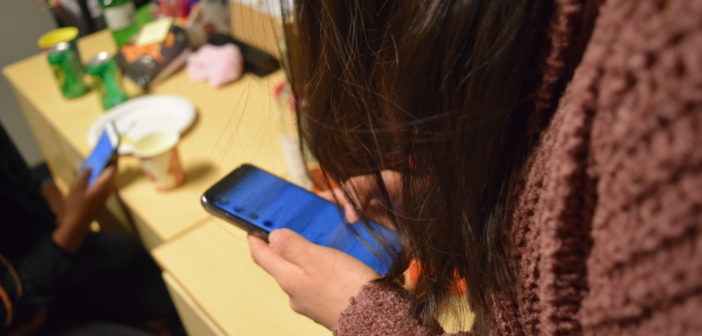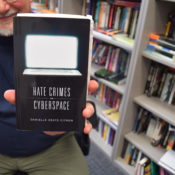It’s happened to nearly all of us: you’re mindlessly scrolling through your Facebook feed, skimming the dozens of posts about Cheryl’s new nephew or peeking at John’s new profile picture, until you spot it: another heated debate between two social media users. Suddenly, you’re intrigued. You pause whatever show you’re currently binge-watching and tune in to the real drama: the fight of the keyboard warriors.
What is a keyboard warrior, you may ask? It is a modern term that is used to describe those who engage in heated debates on social media and use aggressive language to create controversy. One question that lingers in the sphere of the internet is why? Why is it that we get enjoyment out of spectating these social media debates? Why do keyboard warriors even get roped into these debates in the first place?
Why do keyboard warriors respond to controversial posts?
According to Dr. Steve Macek, a communications professor at North Central College, the answer has many layers.
Why do people post controversial content in the first place?
The facelessness of social media allows users to feel protected, therefore affording them the opportunity to say things that they normally would not. This offers an explanation as to why people might respond more aggressively to posts that irk them, but it also brings us to the next question. Why do people post controversial articles in the first place? According to account manager at Accounting Principles and active political advocate Cameron Gardner, ’16, people are looking to affirm their own beliefs.
“I think when it comes down to it, people are looking for validation,” he states. “You’re going to feel like you’re on the right side when you have other people telling you that your opinion is right.”
Gardner has been involved in countless debates on social media, and never seems to shy away from the political discourse. Although he admits to having more productive debates in person, he continues to engage in these conversations over social media.
This ideology poses another perplexing inquiry: If people are looking to affirm their beliefs, and discourse is typically more productive in person, why do we take to social media for these exchanges instead of having these important discussions instead of joining an activist group or social movement that advocates for your beliefs? Wouldn’t marching in a women’s march or protesting animal-tested cosmetics lines seem more likely to create change compared to a debate on Facebook? Both Gardner and Dr. Macek seem to agree that social media is a way that people can approach activism in a low-cost manner.
According to Dr. Macek, “it’s (the) perfect medium for encouraging people to engage in low-cost political action… and it makes you feel good, it makes you feel like you’ve done something, even though you haven’t really put yourself out there to do it.” In some ways, perhaps these keyboard warriors truly believe that they are making a difference in the political sphere, and maybe they are.
Is posting political and controversial content on social media effective in bringing change or are these keyboard warriors wasting their breath?
Gardner seems to think that there is something to be said about the effectiveness of political debates on social media.
Gardner states that these keyboard warriors are truly convinced that they may be making a difference on political issues in the long term, but are they really? Dr. Macek believes that social media can be useful for political activism, but only when it is used in an effective way.
So perhaps there is potential for change by using social media as a platform for political discourse. Dr. Macek suggests that using social media to privately organize marches, boycotts or other political acts can be useful. Yet, Dr. Macek concludes that political or social debates on a public social media forum can lead to aggressive discourse and tension in interpersonal relationships. “Even though the posts we put out (online) are a performance for an audience, still we feel that they are an extension of ourselves. So if somebody insults us on social media, it stings,” he said.
 Furthermore, Dr. Macek believes these interactions may also intercede in our real lives, not just our virtual ones. “If someone has a nasty exchange on social media, it does overlap with our real life. Other people we do see on a regular basis may witness that exchange online. So we can feel a little embarrassed or self-conscious because of something that was said to us online, or something we said to someone else, so it causes drama,” he said.
Furthermore, Dr. Macek believes these interactions may also intercede in our real lives, not just our virtual ones. “If someone has a nasty exchange on social media, it does overlap with our real life. Other people we do see on a regular basis may witness that exchange online. So we can feel a little embarrassed or self-conscious because of something that was said to us online, or something we said to someone else, so it causes drama,” he said.
Is there an impact on relationships?
North Central College student Tori Castro, ’19, has had personal experience with this. “There have been times where I walk away from a heated conversation on Facebook thinking that the interaction had no impact on my relationship with them… come to find out, there was one person in particular who was so upset by a conversation that we had on social media, that they actually deleted me off all forms of social media and stopped being friends with me. It seemed to be a pretty heated debate at the time, but I was surprised to see how it hurt someone else on such a personal level,” she said.
Although most people would want to avoid this kind of negative interaction, Dr. Macek suggests that there are very specific groups of people who genuinely find entertainment from creating heated discourse on social media.
Taking all of this into consideration, one might want to think twice before jumping into a controversial debate on social media, no matter how “triggered” you may feel.
What’s the solution?
Well, next time you’re scrolling through your Facebook newsfeed and happen upon a debate, you may want to keep scrolling. If the inner keyboard warrior in you truly won’t allow you to ignore the discourse, just keep in mind a few things. There are people who create controversial content simply to trigger other people into debating with them, as a form of entertainment. Furthermore, those who get roped into heated social media debates with people they know run the risk of creating tension in their personal lives. Even if the conversation is with a stranger, it is unlikely that change is going to result from the discussion. If you’re looking for an immediate way to make a difference and stand up for a particular cause, you might want to look elsewhere for more effective forms of activism. Alternatively, you can use social media as a tool to privately organize a social movement. So let’s use public forums on social media to focus less on aggressive discourse and instead, throw some likes and comments at John’s new profile picture.
Photos and videos by Kassidy Gardner.






